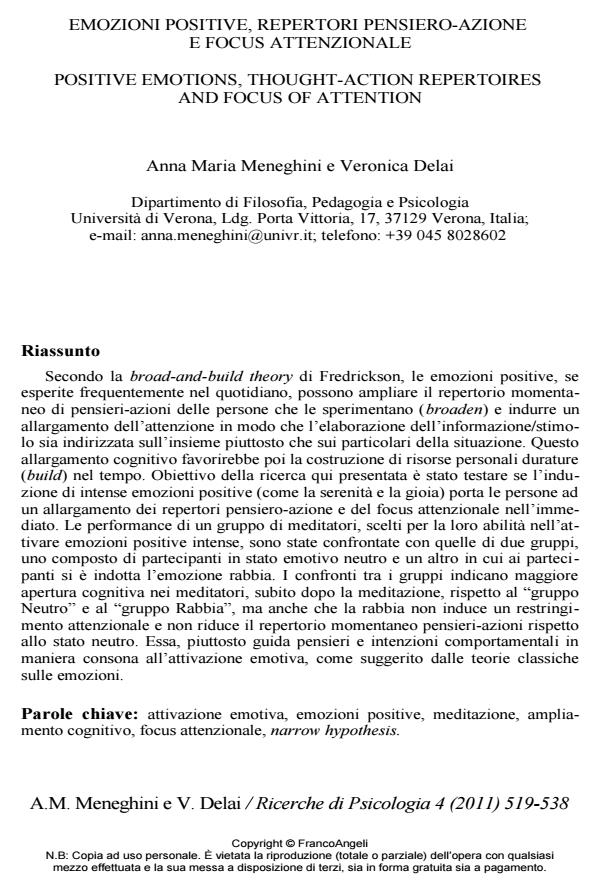Positive emotions, thought-action repertoires and focus of attention
Journal title RICERCHE DI PSICOLOGIA
Author/s Anna Maria Meneghini, Veronica Delai
Publishing Year 2013 Issue 2011/4
Language Italian Pages 20 P. 519-538 File size 968 KB
DOI 10.3280/RIP2011-004005
DOI is like a bar code for intellectual property: to have more infomation
click here
Below, you can see the article first page
If you want to buy this article in PDF format, you can do it, following the instructions to buy download credits

FrancoAngeli is member of Publishers International Linking Association, Inc (PILA), a not-for-profit association which run the CrossRef service enabling links to and from online scholarly content.
According to Fredrickson’s broaden-and-build theory, if positive emotions are frequently experienced during the course of a day, they can broaden the individual thought-action repertoire (broaden) and drive the focus of perception toward the “big picture” rather than small details. In addition, this cognitive widening promotes the building of individual psychological resources (build), which can be employed by the subject in the future. The aim of the present study was to evaluate whether induced intense positive emotions (e.g. serenity and happiness) cause a momentary widening of thought-action repertoires and of the focus of attention. The performance of a group of people who regularly practise meditation (specifically selected for their ability to self-induce intense positive emotions) was compared to the cognitive performances of two other groups one of people in a neutral state of emotion and the other with people who were feeling angry immediately before assessment. The results showed that immediately after meditation, people who regularly practise were in a more broadened cognitive state in comparison to the other groups who were tested during their daily activities or immediately after the induction of feelings of anger. Results also show that induced anger did not narrow either the focus of attention or thought-action repertoires in comparison with the neutral state group. In fact, feelings of anger drive thoughts and behavioral intentions in tune with the state of emotional arousal, as proposed by classical theories regarding emotions.
Keywords: Emotional arousal, positive emotions, meditation, cognitive broadening, focus of attention, narrow hypothesis.
Anna Maria Meneghini, Veronica Delai, Emozioni positive, repertori pensiero-azione e focus attenzionale in "RICERCHE DI PSICOLOGIA " 4/2011, pp 519-538, DOI: 10.3280/RIP2011-004005